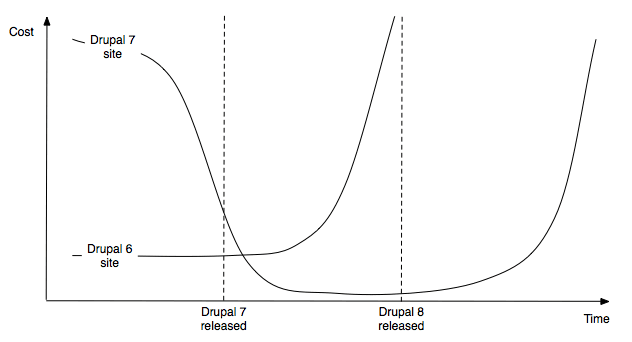Fair warning if you’re only interested in travel-related content you might want to turn off now – this is a heavily tech-related article!
For those who work with Drupal, the open source content management system, a question of many people’s minds now is whether they should upgrade to Drupal 7 or stay on an earlier version (usually 6). This is an especially tricky decision for larger websites using Drupal since the upgrade process is often far from simple. If you’re interested in upgrading and looking for reasons to persuade decisions makers, below is a list of the top reasons I’ve come across to make the leap:
1. Responsive Template Support
With responsive design becoming increasingly popular, if you’re looking to implement a new theme using this technique it will be much simpler to do in D7. Trying to do this in D6 would be far less efficient due to the outdated version of jQuery and other resources.
2. More Extensible Fields
CCK fields in allow you to greatly customise content types and extend vocabularies/taxonomies (e.g. adding region codes to a set of countries). This is now built into the core of D7 (called Fields API) making it even more extensible and easier/quicker to make changes.
3. Better Backend Interface
Changes include a new administration theme, reorganisation of the menu system, inline administration links, more thorough use of drag and drop, the inclusion of the Vertical Tabs module and a new administration toolbar. Your editorial team will thank you.
4. Bulk Image Upload
This is one of the most frequently requested features by many content editors if your site uses a lot of photos – this is now possible in D7 with conversion to the new Media module.
5. Better Workflow Capabilities
Workbench provides improvements for managing content in D7, including a simplified UI for content editors and a customizable editorial workflow that integrates with access control permissions. Great if you have a large team of editors.
6. Semantic Web Technologies
D7 includes RDFa which is an extension to HTML5 that helps you markup things like People, Places, Events, and Reviews. Search Engines and Web Services use this markup to generate better search listings and give you better visibility.
7. Revamped Database Layer
D7 improves on D6, with a fully Object Orientated database layer that provides the ability to support multiple database types at once, transaction support, master/slave replication support, database-specific optimisations, and improved database portability. This provides much more flexibility to developers.
8. Improved Caching Support
D7 provides a better inbuilt caching system and improved support for third-party caching systems including Boost, Varnish, and Memcached.
9. Based on Latest Version of PHP
Which performs better, contains hundreds of bug fixes and security updates.
10. More Efficient Development

Development work on each successive version of Drupal has become more efficient. We are right in the middle of the version life-cycle between D7 and the release of D8 with most major modules being in a stable state – now is the optimal time to upgrade so you can take advantage of the efficiencies gained from D7.
Note: none of the above is black & white but should at least provide a starting point for debate. Let me know if you have any other good reasons to upgrade.

Reply